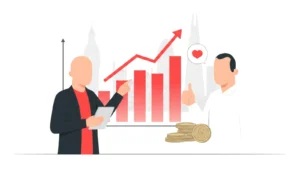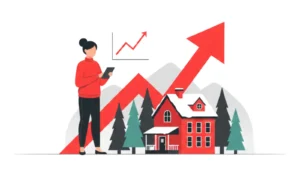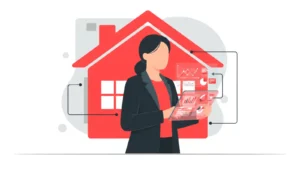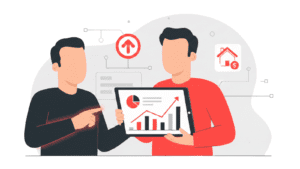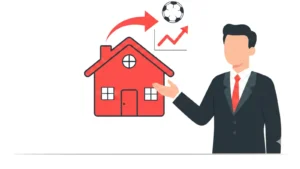Table of Contents
Updated : Mar 28, 2025
Precedence Research forecasts that short-term rental space will expand by 10.70% CAGR between 2025 and 2034, with a revenue potential of up to $344.06 billion. You can also have a share of the pie with the help of a dedicated Airbnb revenue manager.
After all, like any business, generating revenue for short-term rental homes isn’t straightforward. To plan and execute a revenue management strategy, you must understand the nuances of local Airbnb markets. With multiple properties in your portfolio, adjusting pricing for each listing to stay profitable will become impossible as the market changes frequently.
As Chetan Patel (Hospitality digital & CRM specialist) said, “Half the battle is won if you can get the pricing right.”
Thus, hiring a revenue manager is necessary to get the most out of your money.
Who is the Airbnb Revenue Manager?
An Airbnb revenue manager (RM) helps property managers optimize their listings’ financial performance. This person applies analytical and problem-solving skills to make effective pricing adjustments and meet vacation rental profit goals.
When Do You Need a Revenue Manager for Your Vacation Rental: Key Signs
These signs are your wake-up call to outsource revenue management.
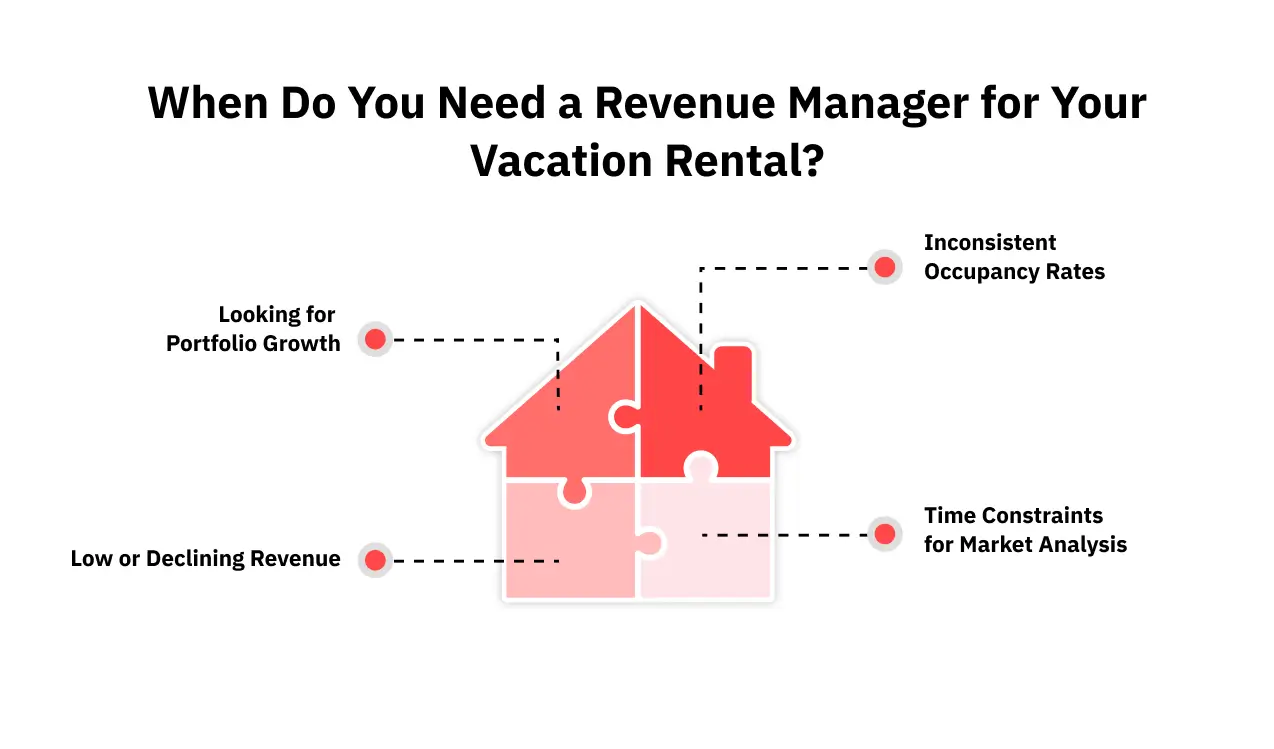
1. Portfolio Growth
Your DIY revenue management approach may work for one STR property but not for multiple properties. The revenue strategy right for one of your Airbnb market segments may not fit another. A property management company with a vast portfolio and a wider audience usually needs more in-depth and flexible pricing plans.
So, you need a full-time revenue manager to make pricing decisions that would please all your potential customers. Proficient Airbnb RMs look at your portfolio through a purely financial lens. They monitor neighborhood competitors and portfolio performance to create a tailored Airbnb business plan based on the unique value proposition for each listing.
Additionally, these professionals ensure accurate courses of action for each property, such as listing optimization, social media marketing strategy, enhancing guest experiences, collecting guest reviews, and more. Their expert recommendations will allow you to scale your STR portfolio.
Read More: How to optimize Airbnb listing?
2. Inconsistent Occupancy Rates
Do you often struggle with less predictable demand patterns and booking cancellations? In these situations, a revenue manager’s strategic pricing decisions are more than necessary to improve your occupany rates.
The constantly changing vacation rental market impacts your property’s occupancy rates. One month you are fully booked, and the next month you have 50% vacant units. An Airbnb RM will help you find the root causes for those underperforming periods.
On the YouTube channel, James Svetec suggests, “use dynamic pricing tool or spreadsheet to determine whether you’re overpriced or underpriced and make adjustments as needed.
Tracking is vital to suggest relevant occupancy-based pricing plans when short-term rental bookings are low. For example, if your vacation rental sells out quickly on Sundays but not on Saturdays or Mondays, an RM will set a two-night minimum length of stay restriction to boost occupancy.
Thus, their deep analysis of your listings’ occupancy helps devise smarter solutions to get more bookings.
3. Low or Declining Revenue
Planning and setting up a revenue strategy on autopilot never works in the vacation rental business. If you believe so, the result will be low income in the long run.
Your listing’s income stream fluctuates based on various factors, including room rates, average occupancy, guest behavior, and market trends. An Airbnb RM will look for the cause of dipping revenue and identify potential income opportunities to keep your STR properties profitable.
Let’s say you plan to sell the last six vacant rooms at a group discount to boost occupancy. On the other hand, the revenue manager will recommend increasing the rates for those unoccupied rooms, anticipating high demand due to the upcoming event in your location.
A revenue manager will find the sweet spot to sell room inventory without incurring losses through discounted nightly rates. Their goal is to balance OR and ADR for maximum profit margins.
4. Time Constraints for Market Analysis
Does vacation rental management hardly spare you time? In the limited time, you’ll either do a half-baked market analysis or not at all. It’ll be a major blunder for any vacation rental business.
Here, you need a revenue manager to regularly make and update pricing decisions as per the current market demands. RMs will make changes based on the data and their personal experience in the industry as and when they see fit.
Thus, someone will continuously track the market and monitor the income for your listings. This person will do all the heavy lifting on your behalf, sparing you enough time to complete other STR tasks.
”They work behind screens, balancing spreadsheets and competing priorities, all while racing against time to seize every revenue opportunity.”
– Anders Johansson, Revenue Management Expert
Problems Solved by an Airbnb Revenue Manager
Maximize your property’s year-round earning potential by hiring a revenue manager to address these key vacation rental challenges:
1. Breaking Down Market Complexity & KPIs
Measuring property management KPIs (Key Performance Indicators) is your success roadmap. The Airbnb revenue managers anticipate business flows by regularly tracking your Airbnb KPIs like ADR, RevPAR, OR, average length of stay, repeat guest bookings, etc. This insight helps them understand how your properties are performing in terms of bookings and guest satisfaction.
RMs also create monthly forecast reports of future demand based on historical data, booking trends, market conditions, and seasonal variations. For example, the per-night cost in Indio during the Coachella and Stagecoach events will be higher than at other times of the year.
Thus, analyzing market data and performance metrics helps them take necessary actions to improve profitability. They think like an entrepreneur – what impact will this pricing decision have today, next week, and in the long term?
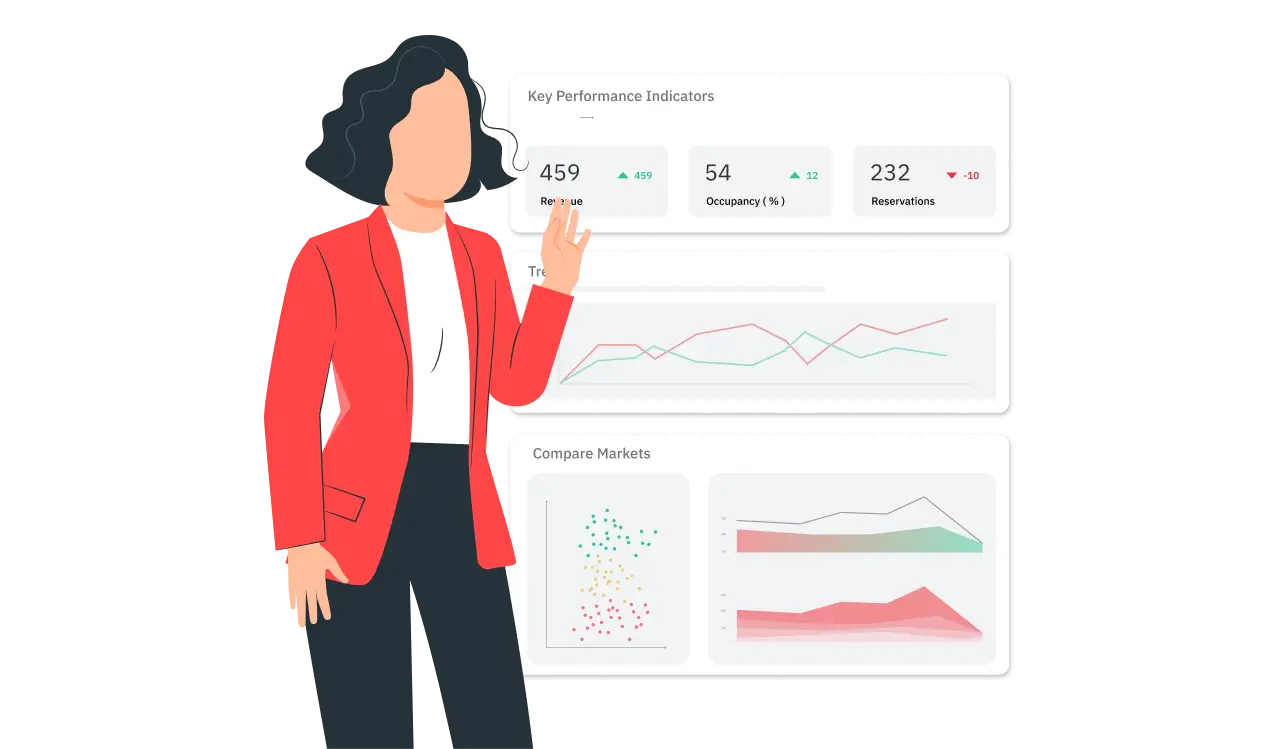
2. Seasonal Strategy Adjustments
The price you set for your mountain cabin in peak winter may not be right for spring or monsoon time.
If demand for your Airbnb drops during certain seasons, a revenue manager will plan new marketing and pricing strategies to attract more customers during non-peak periods. They’ll also use revenue management software like PriceLabs to set optimal seasonal rates based on booking trends in your listing’s locality.
Hence, revenue managers aim to offer the right price at the right time, ensuring your vacation rental is ready for all seasonality demands.
3. Pricing Optimization
No one will succeed in scaling their portfolio with flexible pricing. That said, dynamic pricing improves revenue during high demand and boosts bookings in low-demand periods.
“Traditionally, Airbnb hosts relied on fixed nightly rates, adjusting them occasionally based on personal judgment. However, this static pricing model became outdated as demand fluctuated unpredictably.”
– David Michael, CEO at Booking Ninjas
A revenue manager’s income strategy depends on the supply and guest demand data. They use dynamic pricing software like PriceLabs to make data-driven decisions and balance demand across all your listings. For example, they can release special discounts on last-minute bookings or extended stays to attract more bookings.
PriceLabs Revenue Management Software
Analyzing your competition and manually updating your pricing can be tedious and prone to errors. With PriceLabs Revenue Management Tool, you can automate pricing updates based on real-time market trends.
Sign Up For Free Trial4. Competitive Analysis
Travelers check out your competitors when they search for accommodations. Hence, comparing your listings with other properties in your locality is another key step to identifying trends and optimizing revenue strategies for managers.
With a regular comp analysis on PriceLabs Market Dashboard, RMs see what’s happening in other Airbnb properties in real time. They can review:
- What are the competitors doing?
- What are the target guests willing to pay?
- Why do target guests choose competitors?
- Do competitors have any special promotions or offers?
- What are the guest reviews on competitors’ STR properties?
These comparison metrics will help them decide what nightly rates to apply when to adjust pricing, and when to loosen or tighten stay restrictions.
How to Hire the Right Revenue Manager?
To understand how reliable a revenue manager will be for your Airbnb management business, look for the following skill sets, expertise, and terms.
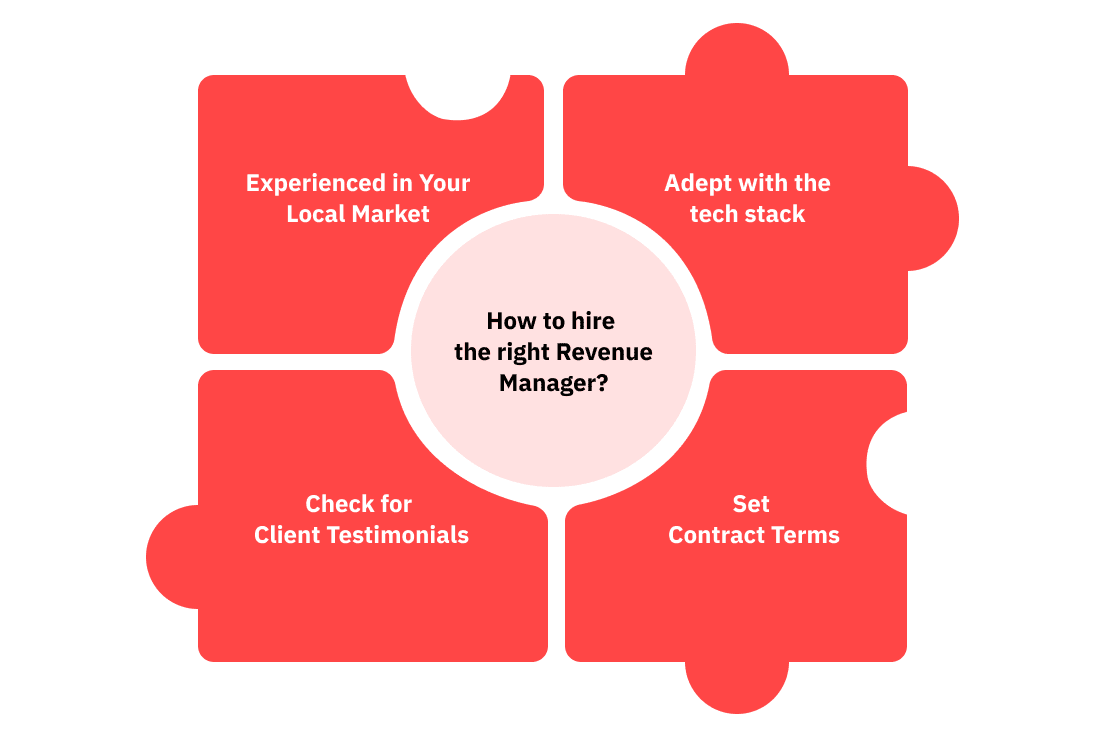
1. Experienced in Your Local Market
You need someone who knows your area inside out. A revenue manager with hyper-local knowledge will optimize pricing dynamically, anticipate market shifts, and avoid costly errors.
So, ask the candidates about the specific neighborhoods or major local events that drive demand in your area. If they fail to name one, keep looking.
2. Adept with the tech stack
Technology is a vital part of day-to-day operations for an Airbnb revenue manager. So, you must hire a professional with technology expertise to plan revenue optimization strategies.
A tech-savvy revenue manager must be able to use
- Revenue management solution to apply optimal rates to improve occupancy and income
- Market analysis dashboard to get insight on KPIs, market demands, and competitor rates
- Channel manager to feed inventory availability and updated rates to OTA platforms
A skilled revenue manager knows the ins and outs of each system.
3. Check for Client Testimonials
You should verify the candidates’ past performance. Don’t just skim reviews, but verify their track record. Ask for 3 to 5 references from Airbnb hosts or property managers they’ve worked with before.
Next, contact those past clients directly and inquire:
- Did they consistently hit revenue targets?
- Were they proactive in adjusting strategies?
- How did they handle low seasons or cancellations?
It’s not just about positive feedback but also about how the manager handles downturns or crises.
4. Set Contract Terms
Protect your business by clearly defining expectations and deliverables in the contract, such as scope of work, measurable outcomes, data transparency, term length, and exit clauses.
Cost Considerations and Fee Structures
If you have a small portfolio, you’ll usually pay a 5% to 8% fee of total revenue, whereas larger portfolios charge 1% to 3% of total revenue.
You can also consider a flat monthly fee structure while hiring an Airbnb revenue manager. These charges will depend on your market complexity and portfolio size.
Don’t forget to ask about hidden charges like software subscriptions or setup fees.
Questionnaire to Interview Airbnb Revenue Manager
Use this questionnaire checklist to assess a revenue manager’s expertise, analytical thinking skills, and fit for your business:
- Walk me through how you analyze and stay updated on trends in your region.
- What strategies have you used to maximize revenue for properties during low seasons?
- What factors do you consider in your forecasting?
- What tools do you use to monitor local competition?
- What metrics do you track daily vs. weekly, and how do you use them to adjust revenue optimization strategy?
- How do you handle situations where your strategy isn’t delivering results?
- A client complained that their occupancy rate had dropped 20% YoY. How would you diagnose the problem and fix it?
- How would you handle a sudden change in the Airbnb algorithm that hurts visibility?
- How did you handle a disagreement about pricing strategy with a property manager?
- What’s your preferred frequency and format for reporting performance results to clients?
Frequently Asked Questions
1. What does an Airbnb revenue manager do?
An Airbnb revenue manager’s responsibilities include analyzing market trends, forecasting, managing inventory, and optimizing distribution channels to ensure optimal financial performance and revenue growth.
2. How do you calculate if Airbnb will be profitable?
To figure out your Airbnb’s profit margins, calculate the annual gross revenue by multiplying the average daily rate (ADR) by the occupancy rate (OR) and the number of available nights. Then, subtract operating expenses to find your net income.
3. How do you increase Airbnb revenue?
Use PriceLabs dynamic pricing software to adjust pricing based on historical data and up-to-date market insights. Besides, add unique experiences and amenities and optimize your listings on OTAs to attract more guests.
It’s Time To Make the Leap
Don’t leave your Airbnb revenue goals up to chance! While you may feel confident adjusting the pricing for your listing, you won’t have enough time to dedicate to the lengthy market analysis process.
Successful Airbnb property managers don’t do everything themselves. They outsource the revenue management duties at the right time to stay profitable. From tracking competitors and demand trends to analyzing portfolio performance, an Airbnb revenue manager constantly looks for new ways to update nightly rates and increase revenue.



